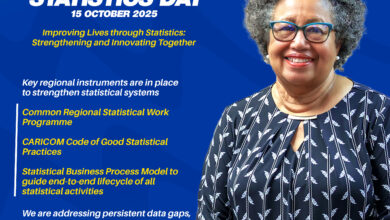The Heads of Government Information Services (GISs) of the Caribbean Community (CARICOM) have outlined a series of measures intended to ensure that their agencies are fully integrated in national and regional initiatives.
This they did at their Third Meeting, which concluded in Barbados on 12 October 2004. Under the chairmanship of the Chief Information Officer of Barbados, the Community's Directors of GISs and Chief Information Officers, recognised that they faced tremendous challenges, particularly from advances in Information and Communication Technology (ICT) but outlined recommendations on measures to overcome these.
Not withstanding their many challenges, the Heads of GISs were told by Deputy Secretary-General of the CARICOM Secretariat, Ambassador Lolita Applewhaite that the Community needed to benefit from their specialised knowledge with regard to government policies, plans and positions.
In his feature address Parliamentary Secretary in the Ministry of the Attorney General and Ministry of Home Affairs, Barbados, Reverend Joseph Atherley emphasised that people had a right to knowledge and gave crucial context for the work of the GIS professional today.
The meeting saluted former Chief Information Officer of Barbados, Ms. Margaret Hope for her many years of committed service and contribution to the goal of regional integration.
Mindful of the critical role they are being called upon to play as communication and information advisors to their clients, government departments and agencies, GIS Heads also recognised that the competitive environment of the media market, underpinned by rapid development in technology, posed some challenges to core functions of GISs.
They however agreed that developments in technology must also be seen as opportunity for a reliable and increasingly less expensive tool of content delivery.
The Meeting agreed that particularly in light of the fact that the media environment is increasingly competitive and that GISs do not have a right of place except insert themselves as a viable media option for consumers, and to produce content of a high quality to capture the imagination of consumers.
It was noted that the GISs needed to develop stronger relations with national broadcast systems. In addition, the Caribbean Broadcasting Union (CBU) invited GISs that are not yet members of the CBU to join the regional system. It was agreed that the training opportunities afforded through the CBU would be of tremendous benefit to staff of the GISs in building expertise and capacity.
In the area of public education, the Heads of GISs agreed that they had a pivotal role to play in ensuring that nationals in Member States were duly informed and educated of commitments in regional development and integration.
In this regard it was decided that GISs would establish a focal point to work with relevant national agencies and the CARICOM Secretariat. It was noted that this approach would ensure that the GISs met their responsibility in helping to create a regional identity among nationals within individual Member States and provide channels of articulating the rights of nationals of Member States as set out in the Revised Treaty establishing the Caribbean Community (CARICOM) including the CARICOM Single Market and Economy.
The Heads of GISs recognised the need to solidify a network for cooperation. It was further agreed that a proposal by Barbados on a mechanism for collaboration would be refined and implemented.
Contact:
Huntley Medley
hmedley@caricom.org
Rose Blenman
rblenman@caricom.org





